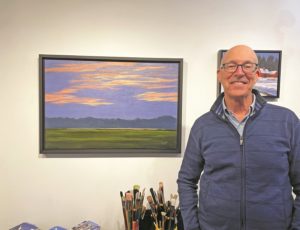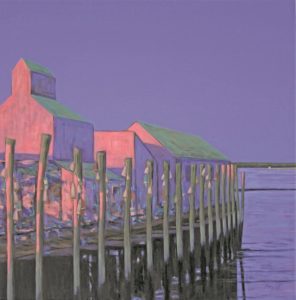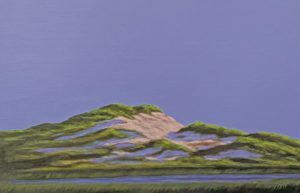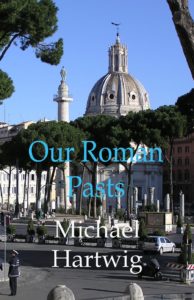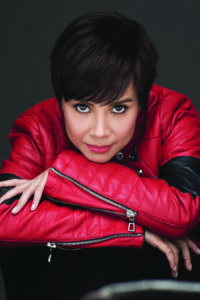Canadian artist Laurie Skantzos makes thick plywood constructions with vibrant, painted edges that blur the line between painting and sculpture. She thinks of them as “wall sculptures.”
Approaching a piece like Portal — Silver Lining Playbook, one starts to notice a subtle pink glow on the wall around it. Stand a few feet away, and the colors pulsate. Up closer, the viewer can’t help but peer around the edges, which are painted neon pink to create the halo. The white wall of the gallery becomes an active participant in the piece, reminding the viewer that even a relatively flat object affects the space around it.

The colors on the surface of the panel, painted in concentric circles, move gently from one to the next. Skantzos used stencils and a squeegee to apply the oil paint, which she mixed with cold wax medium, giving the surface a smooth matte finish. The juxtaposition between muted and vibrant color moves the viewer’s eye in, out, and around the piece.
The desire for continued deep looking and an immersion in the abstract space of an artwork seem to undergird all of Skantzos’s work. “My interests are in color and form,” she says. “I’m not as interested in the conceptual.” Inevitably, however, conceptual concerns emerge.
The viewer is rewarded for staying with each piece a little longer than usual, absorbing the slow shifts in value and dramatic shifts in tone and contemplating the painting as an object. Her work raises questions: What is a painting? How do we look at it? Does a painting have to be flat? How does it operate in space?
Skantzos has been influenced by minimalism, a movement that focuses primarily on geometric shapes, color, and material as subjects. Minimalist artworks direct the viewer to respond to concrete elements of a picture rather than something referential like a recognizable landscape or object.
Skantzos cites Agnes Martin and Frank Stella as important influences. One of her pieces, For Agnes and Frank, is an ode to the two artists. To the right and left of the central rectangular panel, semicircles protrude in an ear-like fashion and are painted with bands of color, a signature of Skantzos’s work. The protrusions are a reference to Stella, who made paintings with flat stripes of bright color on large, shaped panels.
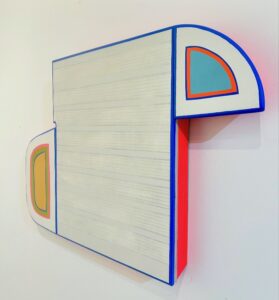
The central surface is a muted gray with thin, horizontal graphite lines spaced like sheet music. This is a reference to Martin, who was known for her quiet surfaces — paintings of grids or stripes that are so soft that they’re barely there.
Because of their subtlety, Martin’s paintings don’t photograph well, and Skantzos admits to having been unimpressed when she first saw Martin’s work on a slide at school. Then she saw the work in person. “I was blown away, but in a quiet way,” Skantzos says. “I was drawn into it. I can stand in front of her pieces for a long time.”
Skantzos was born in Toronto and now lives and works in Guelph, Ontario. In 2000, she graduated from the University of Waterloo. She was in her late 20s and had two children when she attended the university. Not expecting to study fine art, she took a drawing class and never looked back.
Her work has gone through many iterations over the years. In 2018, she was using hand-cut paper stencils to apply paint to the surfaces of her abstract paintings. “I had a large studio at the time, and I would spread the paint-encrusted templates out on the floor,” says Skantzos. “As I used them over and over, they developed a beautiful patina.” She realized that she was more interested in what was happening on her studio floor than in her paintings.
Skantzos started to collage her stencils together and mount them on plywood cut to match the outer contour of the collage. Eventually, this evolved into painting directly on the plywood — a process she has continued to develop using shaped plywood cutouts with deeply beveled edges that make the works appear to float off the wall.
Skantzos cites Josef Albers as another early influence. Albers is known for his seminal text Interaction of Color, which discusses how perceptions of color change depending on the spatial relationship among colors.
With an understanding of color theory in mind, Skantzos now uses color intuitively. “I paint with more vibrant colors in the winter,” Skantzos says. “Then in the summer, when there is a riot of color in my back yard, I paint more monochromatically. It’s a kind of balancing act. I need to find an equilibrium in my life, and that’s how it happens.”
Although she is still working on her Portals series, her more recent work, including For Agnes and Frank, is all based on flattened cardboard packaging. For her, the empty box that a blow dryer arrived in is an exciting opportunity — it’s a “found shape” ready to be translated into plywood and paint.
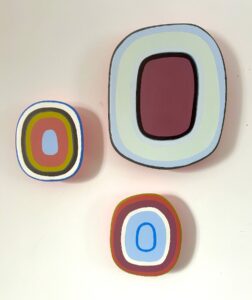
In works like Unboxed I, Skantzos takes something ubiquitous and translates it into something only subconsciously recognizable. “I want the shapes to be familiar to people, but maybe they aren’t quite sure where they know them from,” she says. “Maybe they don’t ever flatten the boxes out completely.”
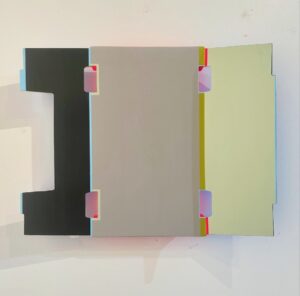
For this piece, Skantzos used acrylic paint and worked without stencils, but she still paid attention to the edges and back side. She wants the action to be “going on behind the scenes.”
There’s a tension in Skantzos’s artwork between what’s hidden and what’s disclosed. The viewer desires to see these “wall sculptures” from as many angles as possible and experience what is hinted at from the front. But the wall is there to stop us, so we return to the fundamental questions: are these paintings or objects, and how do we interact with them?
On the Wall, Off the Wall
The event: Artwork by Laurie Skantzos
The time: Through June 26; opening reception Friday, June 20, 6 to 9 p.m.
The place: On Center Gallery, 352 Commercial St., Provincetown
The cost: Free
